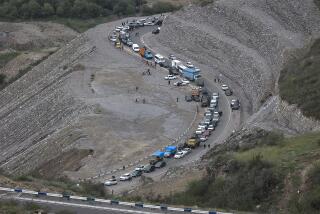The Fuse Is Burning Fast for Karabakh Armenians : Ethnic war: The Soviet collapse left them defenseless; their only hope is the U.N.
- Share via
In February, 1988, Armenians living in the disputed enclave of Nagorno-Karabakh voted overwhelmingly to break away from Azerbaijan and reunify with Armenia. Zealots from Azerbaijan responded with virtual pogroms against ethnic Armenians in the port town of Sumgait. Since then, Azerbaijan has undertaken a relentless campaign to thwart any practical expression of the autonomist aspirations of the Armenian majority in Karabakh. The Azeris have cleared their capital city, Baku, of all Armenians; they have razed Armenian villages and shelled the borderlands dividing Armenia and Azerbaijan. This mass violence has created a homeless population of more than 300,000 refugees in Armenia, a further calamity in a republic that has yet to relocate people displaced by the devastating 1988 earthquake.
Mikhail Gorbachev used to warn the West against meddling in the civil war in the Caucasus. “It’s a domestic dispute,” was his standard reply to critics questioning the wisdom of the Red Army’s attempt to maintain the status quo in Karabakh. Azerbaijan’s President Ayaz Mutalibov, who stood among the first to support the August coup attempt against Gorbachev, and who still blocks democratization in his own republic, has taken the same tack in reaction to international protests concerning Karabakh. He has ignored the appeals of human rights organizations to guarantee the safety of ethnic Armenians in the enclave. For years he has punished the Armenians in Karabakh through starvation by economic blockade. He has refused to negotiate a peace with the president of Armenia, Levon Ter-Petrosyan. When the foreign ministers of the two republics finally met last month under the auspices of Russian President Boris Yeltsin, Azerbaijan had already begun bombing Stepanakert, the capital of Nagorno-Karabakh.
The demise of the Soviet Union has transformed the situation in Karabakh into a crisis of international dimensions. Both Turkey and Iran eye Azerbaijan and the other Muslim republics of the former Soviet Union as potential proxies and are maneuvering accordingly. Last month Turkey’s Prime Minister Suleyman Demirel warned the United States against supporting Armenia. “Let everyone know this does not please Turkey,” he declared. Ironically, this bombastic pronouncement was made just one week after Washington announced its intention to recognize Azerbaijan, notwithstanding the republic’s reprehensible record on human rights. Iran, on the other hand, offered itself as arbiter, and even managed to broker a brief cease-fire last week.
Azerbaijan continues to insist that Karabakh is an internal matter. But its arms buildup, which threatens the security of Armenia and hence the stability of the region, suggests otherwise. Last Monday, Azerbaijani militiamen raided a Commonwealth military base and confiscated 728 wagonloads of artillery shells and more than 100,000 missiles--enough to eliminate the entire population of Karabakh and make considerable inroads into the southern part of the Armenian republic.
After four years, peacemaking efforts within the former Soviet family are no closer to success, and the Commonwealth army has begun its retreat from Karabakh. The Caucasus, like the Balkans, is a powder keg on the verge of explosion, with the potential to wreak disaster well beyond its boundaries. The international community must intervene as it did in Yugoslavia. Armenian and Azeri lives are surely worth no less than those of Serbs or Croats. Once already in this century, the world stood by as Armenians were slaughtered. The United Nations has a responsibility to protect human life and halt the spread of a conflict that could engulf the whole region. Secretary General Boutros Boutros-Ghali must take the initiative and propose a peacekeeping force before more blood is shed.
More to Read
Sign up for Essential California
The most important California stories and recommendations in your inbox every morning.
You may occasionally receive promotional content from the Los Angeles Times.













